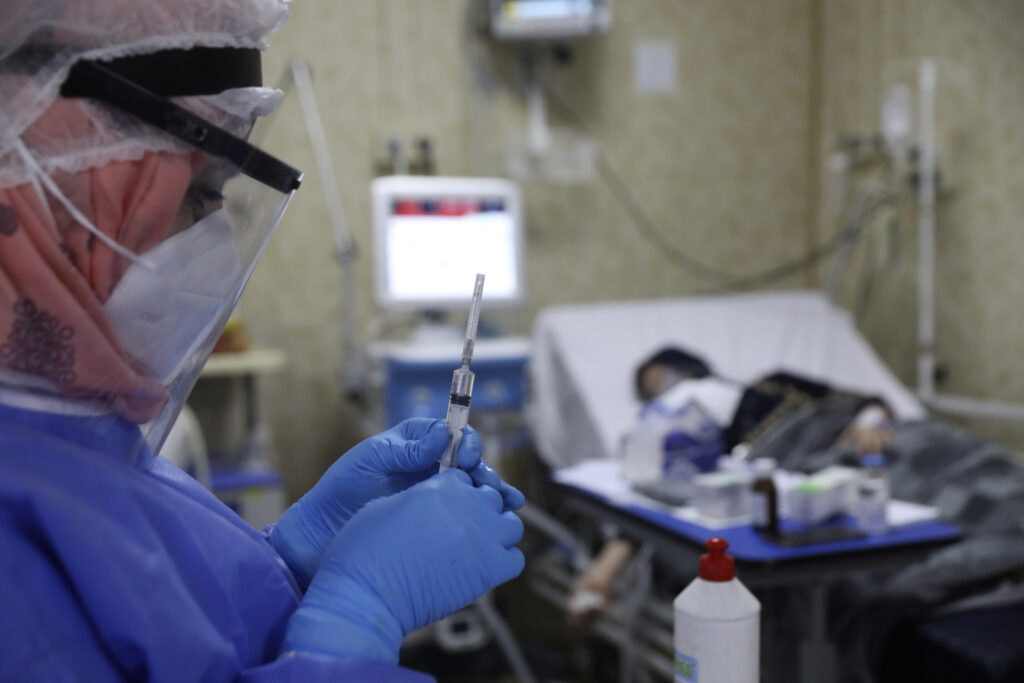Atlanta’s public safety net hospital became the latest to temporarily cancel elective surgeries on Wednesday, saying it’s being overrun with COVID-19 patients.
Grady Memorial Hospital CEO John Haupert made the announcement, saying that the hospital was “inundated” with patients over the Labor Day weekend even though it was officially diverting ambulances.
“Because of the strain this is putting on the health system, our patients, and our staff, we must make some changes to the way we operate,” Haupert wrote. “As of today, we are canceling non-essential outpatient surgery and procedures. We will regularly review patient volumes to determine when we can resume those services.”
More than 5,900 people sickened by the respiratory illness were in Georgia hospitals on Wednesday. COVID-19 patient numbers have been hovering around 6,000, a record high, for more than a week across Georgia. Across the state, 97% of intensive care beds were in use Wednesday, an all-time high.
Some other Georgia hospitals were already postponing elective surgeries, as more than 50 hospitals statewide Wednesday reported they were turning away ambulances bringing emergency or ICU patients.
The 16 hospitals in Piedmont Healthcare, Georgia’s largest hospital system, are making their own decisions, with some locations pausing elective surgeries while others are halting surgeries that might require an overnight stay or an intensive care bed, said spokesperson John Manasso.
“Each of our hospitals reviews available resources daily related to current COVID volume, and where possible, we continue to shift resources as needed to maintain appropriate capacity — as we have since the pandemic began,” Manasso said in a statement.
Wellstar Health System said it’s shifting some surgeries from hospitals to outpatient surgery centers. That hospital group said it may delay some procedures to save bed space.
On the Georgia coast, Southeast Georgia Health System in Brunswick and St. Marys announced last month that it was suspending elective surgeries, but the St. Joseph/Candler system in Savannah is still performing the procedures.
Many medical providers put off all kinds of routine care during the earlier stages of COVID-19 in the spring of 2020, but that strategy was financially harmful and hospitals tried to resume elective care beginning in the summer of 2020.
Grady’s move came as Democratic U.S. Reps. Hank Johnson and David Scott wrote to Georgia Gov. Brian Kemp, urging the Republican to order the state Department of Public Health to postpone elective surgeries in all Georgia hospitals to preserve capacity for COVID-19 patients.
“By pausing elective surgeries, hospitals will be able to provide additional beds, resources and critical staff to areas requiring a higher level of care,” Johnson and Scott wrote.
They also urged Kemp to extend waivers of license requirements for health care workers and hospitals to expand capacity for COVID-19 patients.
Kemp’s position has been that he’s not going to impose any new mandates on anyone during the current COVID-19 surge, even as hospitals set new records for patients and deaths arc upward again. He quickly responded to Johnson and Scott on Wednesday in a letter outlining the steps he was taking to support hospitals and rejected their call to stop any surgeries.
“First, hospitals are already fluctuating and monitoring the volume of elective procedures themselves,” Kemp wrote. “Second, many elective procedures are critical to the short- and long-term health of millions of Georgians. And finally, banning elective procedures would bankrupt hospital systems already reeling from a year and a half of fighting a global pandemic.”
Anna Adams, a spokesperson for the Georgia Hospital Association, said the trade group supports letting its members make their own decisions.
“Hospitals are managing what the surge looks like at their own facilities,” Adams said. “We think that each hospital is doing what’s best for its own community.”
Kemp fired back at Johnson and Scott, saying they could be of more help if they would persuade the federal government to limit how much staffing companies can charge to provide nurses and other workers to supplement hospital capacity. “Currently, states are forced to outbid one another using federal coronavirus relief dollars in order to obtain adequate hospital staffing.”
Kemp also told the congressmen they should “demand” clearer guidance on plans to provide COVID-19 booster shots and seek federal agencies’ “detailed logistical plans to assist states in this enormous undertaking.”
You may also like
-
UWG’s Ingram Library Hosts Pop-Up Study Spot to Help Students Prepare for Finals Week
-
UWG Offers Mental Health Support And Academic Services To Maintain Student Success During Finals Week
-
UWG Alumnus Shares His Experience Exploring the Underground Flood Channels of Las Vegas
-
Georgia Students Simulate the Struggles of Dementia
-
UWG PR Students Score a Georgia Power Tour at Atlanta Corporate Office
